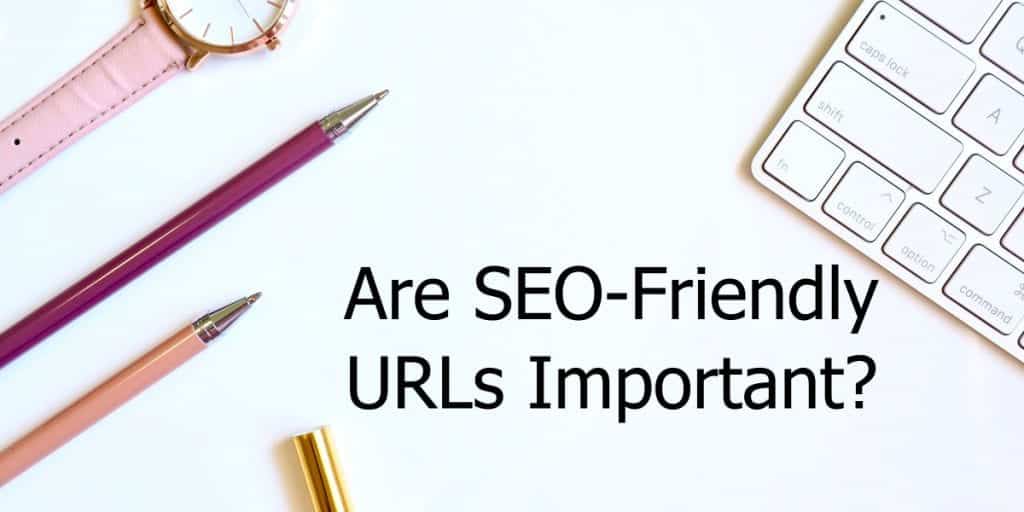Small Business Tech Tips: Are SEO-Friendly URLs Important?
Posted on:

You’ve been hard at work getting all sorts of great content ready to publish on your website. Everything is relevant to your audience, you’ve naturally sprinkled keywords throughout the piece, and you have tried to say as much as possible with as few words, structuring your content to make it more readable.
As you copy and paste your new page into your content management system, you notice that whatever you’ve titled your page has become the URL. Or, even worse, you see a random string of numbers in the URL. Because you know that Google sees everything on your website, good and bad, you may wonder how these URLs could impact your site’s rankings.
Is the URL of a page important to your site’s SEO?
The answer is a little more complicated than a simple “Yes” or “No.” (Of course it is. If it weren’t more complicated, this would be a really short blog post.)
I’ll go into more detail, but yes, your page’s URL is important to your site’s SEO, but it isn’t as important as you might think.
Let’s break this down a little:
How Your Page’s URL Is Important to Your Site’s SEO
Google uses everything on your website to determine how pages relate to one another. The tighter, more logical your site’s overall structure, the better you’ll rank with Google and other search engines. A site with a URL of “yoursite.com/page/12523” is going to be be harder to relate to other pages on the site than a page with a URL of “yoursite.com/services/haircuts.”
URLs that have a clear structure also are more recognizable and friendly to users, making your website more likely to get visited if it shows up in search results than one that just has a string of numbers marking a new page. If a potential visitor searches for “haircuts near me,” for example, and your website shows up on the search engine results page (SERP) with our second example from above, the user can more easily recognize that your page is likely to give him information on haircuts than if your page had the URL from the first example.
If you want your page to rank for a specific keyword, “haircuts,” for example, and the page in question is all about haircuts, you absolutely want to include that keyword in the URL. Additionally, if you want that page to rank for a specific geolocation, include that in the URL, too. This is another way that you can signal to the viewer that your page will be relevant to their specific search, and it’s easily visible in your URL before they ever click.
How Your Page’s URL Is Not Important to Your Site’s SEO
While the URL can serve as an important signal to searchers, and can give a better idea of the overall structure of your website, keywords in your URL isn’t really that big of a determining factor when it comes to rankings. A rep for Google said keywords in a URL are a ranking factor, but a very small one.
In theory, if you’re including important keywords in your URL, and the inclusion of those keywords gets users to click on your website, that’s going to do far more to improve your site’s rankings and traffic than putting keywords in your URLs just for the search engines. As always, keep your potential customer at the forefront in any marketing efforts you undertake, and search engines will follow.
So, Is My Page’s URL Important, or Isn’t It?
Again, the answer here isn’t as straightforward as a “Yes” or “No.”
Your page’s URL is important in helping users, real live people, determine whether or not your page will be relevant to what they’re searching for. The words in your URL can be a determining factor in whether or not searchers click and become visitors, and from there, customers. Your traffic and relevance scores, among other things, do have an impact on search engine rankings.
However, there is no real direct way to determine whether putting keywords into your page’s URL impacts your website’s rankings.
In other words, your site’s URL is important to the rankings when it comes to getting humans to click, and not so important when we’re talking about search engines.
As always, the rule of thumb to follow is to create everything with your visitors in mind, and not to change things because you think that’s what search engines want to see. Build your website for humans, not search engines.
Local SEO Services for Small & Medium Businesses
At 270net Technologies, our Digital Marketing team is experienced at making sure that websites are created with your visitors in mind, and we always adhere to search engine best practices. Whether you need on-site SEO, content marketing, or help developing your website strategy, we can help! Get in touch today!
Tags: content marketing, on-page SEO, Search Engine Optimization, SEO, site structure, URLs